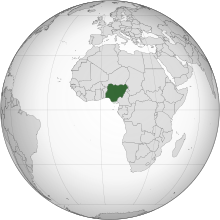This article needs additional citations for verification. (September 2021) |

| Part of a series on |
| Jews and Judaism |
|---|
| Part of a series on the | ||||||||||||||||||
| History of Nigeria | ||||||||||||||||||
|---|---|---|---|---|---|---|---|---|---|---|---|---|---|---|---|---|---|---|
 | ||||||||||||||||||
| Timeline | ||||||||||||||||||
|
||||||||||||||||||
| Topics | ||||||||||||||||||
| By state | ||||||||||||||||||
| See also | ||||||||||||||||||
|
| ||||||||||||||||||
The history of the Jews in Nigeria is a complex subject.
The historic presence of Judaism in Nigeria is a cause of debate, as there are several Judaic-oriented religious groups among the largest ethnic groups in the largely populated nation. The groups claim that their religious practices result either from hundreds of years of continuous practice of Judaic or Judaic-like customs by their ethnic groups, customs inherited from the Jews of Bilad el-Sudan or by a more-recent departure from European Christianity to modern Judaism. Either way, Judaism in Nigeria has developed demographically with the interest of Jewish peoples in other countries, especially Israel and the United States.
Rabbi Yisrael Uzan, a leader in the Alliance of Rabbis in Islamic States serves as the Chief Rabbi of Nigeria and the Chabad representative in Abuja. Rabbi Mendel Sternbach serves as Rabbi of Lagos. They are involved in Humanitarian Aid, especially prior to Ramadan.[1]
- ^ "Jews in Nigeria to distribute 250,000 meals in five cities during Ramadan food rush". Cleveland Jewish News. Retrieved 2021-09-07.